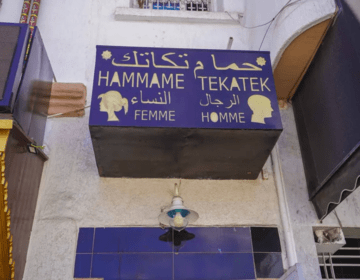Student Spotlight - Allison Ollie, Moroccan Cuisine
Before I was accepted into the Arabic program, I had absolutely no idea what Moroccan food tasted like, smelled like, or even looked like. Throughout my month here, I have probably tried at least one new thing a day and discovered that most of the food I wouldn’t eat back home, is actually delicious (at least the Moroccan take is). In many countries, culture is linked to food. Morocco is a prime example of how food reflects culture and culture reflects the food.
Back in the states, Americans are very centered on “healthy eating”. We constantly hear of nutritional values, Keto diets, fiber intake, etc. This shapes each individual’s relationship with food. The Moroccan relationship with food is a very different environment. Instead of “intermittent fasting”, Moroccans eat four meals a day, and almost always together. Within each meal there is sugar, meat, veggies, fruits, and lots and lots of carbs. The bread, or khubz, is made fresh daily and served with almost every meal. If I had never come to Morocco, I would likely view the bread as unnecessary carbs. I did come to Morocco though, and it has completely changed my relationship with food and its importance to a culture.
You see, bread is a utensil here. It is split amongst the people you are eating with and passed around before every meal. After sharing the bread, you and your friends or family will then share a meal. This food is often couscous or tagine, a meal served in a dish that is placed in the middle of the table and everyone eats from. In the United States, splitting a meal often means one entree placed on two plates. Here in Morocco, there is no splitting, it is the norm to share your food. This reflects the Moroccan culture of “collectivism” which is essentially prioritizing the group (friends, family, etc.) over individuals.
On top of sharing food, the Moroccan opinions surrounding food and eating are drastically different from the American view. Oftentimes, we are told to “eat more” or “eat less” depending on body type and other factors. In Morocco, our host families use food as an expression of love. My host mom spoke broken English, but she was able to welcome me into her home through snacks, home cooked meals, and extra watermelon. Moroccan tea has many rituals tied to it that through drinking it, you are immediately tied to the Moroccan culture. The judgemental culture surrounding food that we find in America is drastically less in Morocco as our host mothers try to plump us up before we go back to “American food”.
My own relationship to food and culture has changed during my trip to Morocco. It no longer feels weird to eat pastries at 4:00 in the afternoon and fruit for dessert. Much like clothing and music, Moroccan food is diverse and vital to the tradition and culture of the country. I hope to bring back some new perspectives on using food as a tool to build relationships and enjoying the food we eat.
Related Posts
Weekend in Marrakesh
Our Weekend in Marrakesh - This blog was written by one of our students - Nyx Lange Reflecting on our past weekend excursion to Marrakesh from our Moroccan base of... keep reading
Exploring Tangier: A Day in Morocco's Gateway to Africa
This past weekend, our group ventured to the north of Morocco to the vibrant city of Tangier where the Mediterranean Sea meets the Atlantic Ocean First, we met our guide... keep reading
Bssaha wa Raha L'hammam🚰🪣🧼 بالصحة و الراحة الحمام
By Program Leader, Mohsin: Hey everyone! As your Moroccan program leader, I’m thrilled to introduce you to one of our country’s most cherished traditions: the hammam. If you’ve never heard... keep reading






